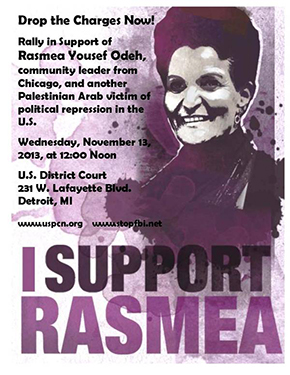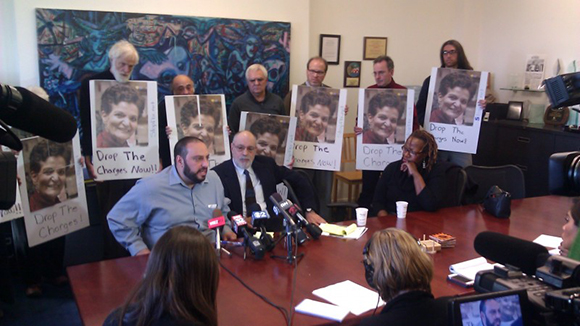by David Finkel
November 14, 2013

Even by the grotesque standards of U.S. immigration “justice,” the case of Rasmea Yousef Odeh has the look of an unusually appalling and political prosecution. A 65-year-old Palestinian and a naturalized U.S. citizen since 2004, Odeh is Associate Director of the Arab American Action Network in Chicago and coordinates the AAAN’s Arab Women’s Committee, with a membership of nearly 600. She received this year an Outstanding Community Leader Award from the Chicago Cultural Alliance, citing her 40 years in service ”to the empowerment of Arab women, first in her homes of Palestine, Jordan, and Lebanon, where she was an activist and practicing attorney, and then the past ten years in Chicago.”
On October 22, Department of Homeland Security agents arrested Rasmea Odeh at her home. She was indicted that morning, charged with Unlawful Procurement of Naturalization for alleged failure to reveal on immigration documents that she served ten years in an Israeli prison, following a 1969 arrest at age 21 in connection with a bombing of a Jerusalem market. Released on $15,000 bond, Odeh’s case will be tried in Detroit (where she received her U.S. citizenship). At her November 13 arraignment, a hundred supporters demanded “Drop the Charges,” including a busload of folks who came in from Chicago and packed the courtroom while others chanted and marched outside.
Why the arrest now, after Rasmea Odeh has lived in the United States for two decades? For one thing, of course, activists suspect the involvement of Israeli intelligence in cahoots with Homeland Security. For another, it occurs in the context of severe harassment of some 23 activists in the Midwest, including Palestinian Americans in Chicago, whom the government is trying to haul before federal grand juries on various “anti-terrorism” pretexts. The prosecution of Rasmea Odeh–who would face upon conviction up to ten years imprisonment, loss of citizenship, and deportation–appears to be a severe escalation in the pattern of repression and intimidation. Because it can become an organizing focus, however, this case might also become a major defeat for the government’s drive to criminalize activism.
A summary of Rasmea Odeh’s activism since the age of 12, as a young Palestinian living under occupation, appears here. It includes her account of her 1969 arrest followed by torture in Israel’s Moscobiya prison compound, where thousands of Palestinian arrestees received similar treatment:
“The first time they stripped me and threw me on the floor, the room was full of men–civilians and soldiers. They laughed at my nakedness and kicked me, beat me with sticks, pinched me all over, especially on the breasts; my body was covered with bruises. Then they got a wooden stick, not a smooth one, and pushed it into me to break the hymen. They brought my father and fiancé to see me. I lost consciousness and when I woke I was in another room, lying on the floor with a blanket over my legs but my body still naked.”

Activists support Rasmea at a press conference about her case.
Odeh was convicted in an Israeli military court, “a court system where the average trial for a Palestinian lasts for three minutes, and has a 99.74 percent conviction rate,” as the Daily Beast article notes. The judicial systems of most countries with such records are not generally accorded much credibility in U.S. jurisprudence, but Israel of course receives special dispensations in this regard.
Sentenced to life in prison, Rasmea Odeh was freed ten years later in a prisoner exchange with the Popular Front for the Liberation of Palestine. Given that Israeli policy has been rarely, if ever, to release those “with Jewish blood on their hands” (the current prisoner release brokered by John Kerry is an unusual exception), the circumstances suggest to me that the authorities may have known that evidence of Odeh’s responsibility for the bombing was questionable at best. Meanwhile, of course, the notorious mastermind of the 1976 bombing of a Cuban passenger airliner (death toll 78) and terrorist bombings of Cuban tourist hotels, Luis Posada Carriles, lives freely and openly in Florida…
Barred from returning to Palestine, Odeh lived in Lebanon and Jordan before immigrating in 1995 to the United States, where she received citizenship in 2004. The demand to drop the charges against her is supported by dozens of organizations including the Center for Constitutional Rights, Jewish Voice for Peace, and the American Friends Service Committee (see here).
The case will be continued late this year or in January 2014. A petition to drop the charges is online. Statements of support can be sent to cppr@aaan.org, where you can also write for information on how to donate to the defense campaign. For updates and additional information, visit the websites of the Committee to Stop FBI Repression and the U.S. Palestine Community Network.
David Finkel is a Solidarity member in Detroit, and an editor of Against the Current.
